

Social Media at conferences (with images, tweets) · ClaireAinsworth. Assignment Calculator. Understand LinkedIn in 30 Seconds. Does Extreme Content Delivery = Learning? Practice, Practice, Practice: Getting that Talk Right. As my last post noted, my mind is inclined to go for a walk during seminars if I’m not careful.
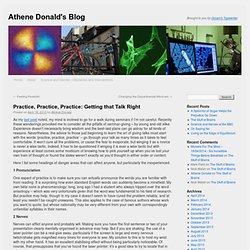
Recently these wanderings provoked me to consider all the pitfalls of seminar-giving – by young and old alike. Experience doesn’t necessarily bring wisdom and the best-laid plans can go astray for all kinds of reasons. Nevertheless, the advice to those just beginning to learn the art of giving talks must start with the words ‘practice, practice, practice’ – go through your talk as many times as it takes to feel comfortable. It won’t cure all the problems, or cause the fear to evaporate, but winging it as a novice is never a wise tactic. Conference social skills. (Hmm, new Blogger interface...)
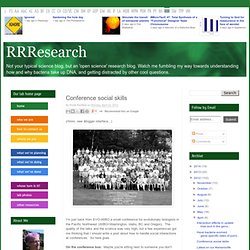
I'm just back from EVO-WIBO a small conference for evolutionary biologists in the Pacific Northwest (WIBO=Washington, Idaho, BC and Oregon). The quality of the talks and the science was very high, but a few experiences got me thinking that I should write a post about how to handle social interactions at conferences. So here goes. On the conference bus: Maybe you're sitting next to someone you don't know, and maybe they're too nerdy or shy or intimidated or self-centered to start a conversation.
Don't just sit there, ignoring each other. At the first-night mixer: You and a friend (or a new acquaintance) are chatting with each other, when a complete stranger walks over and stands near you, looking like maybe they'd like to join the conversation. How to Ask Questions At Conferences and Colloquia. Presenting Conference Papers in the Humanities. How not to ask questions at a conference. I went to Pycon last month (my first conference ever!)
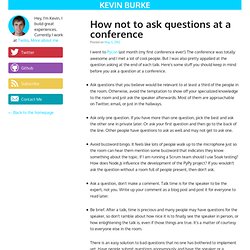
The conference was totally awesome and I met a lot of cool people. But I was also pretty appalled at the question asking at the end of each talk. Here's some stuff you should keep in mind before you ask a question at a conference. Ask questions that you believe would be relevant to at least a third of the people in the room. Otherwise, avoid the temptation to show off your specialized knowledge to the room and just ask the speaker afterwards. Pannell Discussions » 181 – Answering questions after presenting a seminar or conference paper.
You’re well prepared for a seminar or conference presentation, but as the day approaches, doubts and fears emerge.
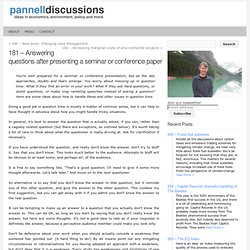
You worry about messing up in question time. Conferences and Courage. Exactly a year ago I wrote about the annual High Polymer Research Group Conference, held at the edge of the Peak District.
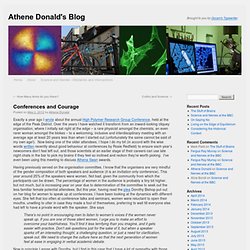
Over the years I have watched it transform from an inward-looking cliquey organisation, where I initially sat right at the edge – a rare physicist amongst the chemists, an even rarer woman amongst the blokes – to a welcoming, inclusive and interdisciplinary meeting with an average age at least 20 years less than when I started out (unfortunately the same cannot be said of my own age!).
Now being one of the older attendees, I hope I do my bit (in accord with the wise words written recently about good behaviour at conferences by Rosie Redfield) to ensure each year’s newcomers don’t feel left out, and those scientists at an earlier stage of their careers can use late night chats in the bar to pick my brains if they feel so inclined and reckon they’re worth picking.
Asking Questions at Academic Conferences — Faculty of Social Sciences. Asking Questions at Academic Conferences: Summary Erin Aspenlieder, PhD Centre for Leadership in Learning McMaster University aspenled@mcmaster.ca.
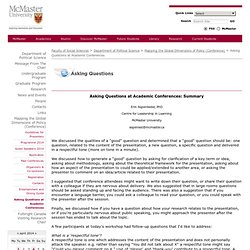
How to Present and Answer Questions at Conferences and Colloquia. 10 Fun Tools To Easily Make Your Own Infographics. People love to learn by examining visual representations of data. That’s been proven time and time again by the popularity of both infographics and Pinterest. So what if you could make your own infographics ? What would you make it of? It’s actually easier than you think… even if you have zero design skills whatsoever. Below are my two favorite infographic-making web 2.0 tools that I highly recommend. 3 Free Tools for Creating Your Own Infographics. One way to communicate a large sum of data and information is to create an infographic -- a visual representation of a group of data points.
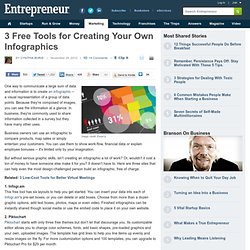
Because they're composed of images, you can see the information at a glance. In business, they're commonly used to share information collected in a survey but they have many other uses. Business owners can use an infographic to compare products, map sales or simply entertain your customers. You can use them to show work-flow, financial data or explain employee bonuses -- it's limited only by your imagination. Conferences and Courage. Networking for Introverts: 3 Tips for Success. Question: How many introverts does it take to hold a meeting?
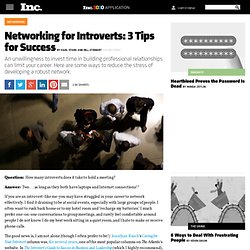
Answer: Two... as long as they both have laptops and Internet connections! Rules for conference presentations. Having just returned from a conference where the presentations were a little mixed – to say the least – I was reminded of the reality that conference presentations are not the same as the conference paper.
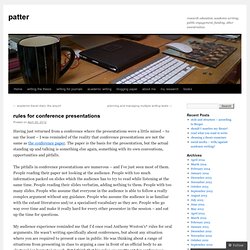
The paper is the basis for the presentation, but the actual standing up and talking is something else again, something with its own conventions, opportunities and pitfalls. The pitfalls in conference presentations are numerous – and I’ve just seen most of them. People reading their paper not looking at the audience. People with too much information packed on slides which the audience has to try to read while listening at the same time. People reading their slides verbatim, adding nothing to them. My audience experience reminded me that I’d once read Anthony Weston’s* rules for oral arguments. Here’s his six golden rules.
10 tips on how to give an academic talk. The biggest mistake academics make is misjudging their audience.
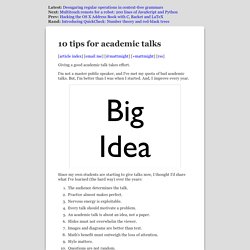
I've been to (many) talks where the talk itself was presented to one or two people in a room of hundreds. (Disclaimer: I've given my fair share of these talks too.) When preparing a talk, glance at the program for the event, or ask your host what you should expect of the audience in terms of background knowledge. Aim appropriately. When we speak on favored topics, our instinct is to gloss over concepts and details that once took us the better part of grad school to understand. It feels awkward, or even insulting, to recap "introductory" material.
There's also a negative feedback mechanism in academic culture. The 10 Commandments of Presentations. Presentations: Billboard science : Naturejobs. Designing conference posters » Colin Purrington. A large-format poster is a big piece of paper or wall-mounted monitor featuring a short title, an introduction to your burning question, an overview of your novel experimental approach, your amazing results in graphical form, some insightful discussion of aforementioned results, a listing of previously published articles that are important to your research, and some brief acknowledgement of the tremendous assistance and financial support conned from others — if all text is kept to a minimum (less than a 1000 words), a person could fully read your poster in 5-10 minutes.
Section content • DOs and DON’Ts • Adding pieces of flair • Presenting • Motivational advice • Software • Templates • Printing • Useful literature • Organizing a poster session What to put in each section Below, I’ve provided rough tips on how many words each of these sections might have, but those guesses are assuming you have a horizontal poster that is approximately 3×4′. Adjust accordingly. DOs and DON’Ts 1. 2. 3. Writing conf abstracts. Perfect Posters.